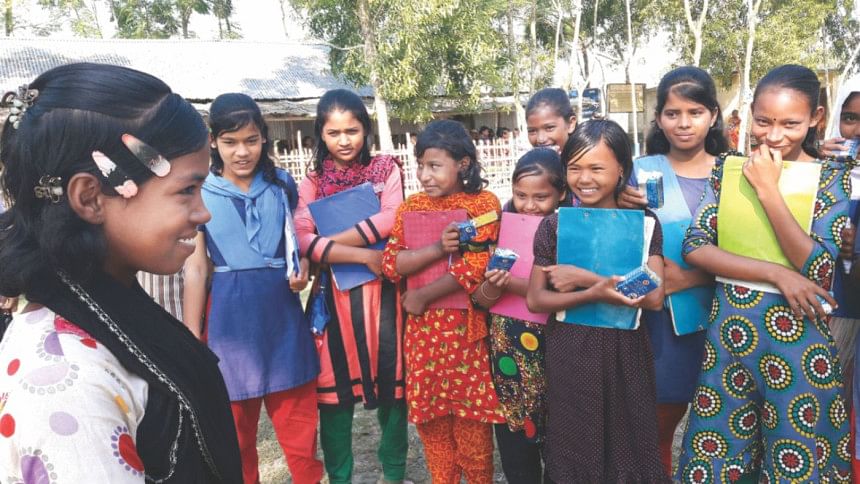Fifth grader strives for students' rights

Class-five schoolgirl Himu Akhter isn't shy to make her voice heard. The student of Purbo Dawabari Madhyapara Government Primary School in a char area of Lalmonirhat's Teesta River is determined that students of schools in remote areas need not accept less than full educational facilities.
In many ways, Himu is just an ordinary school-goer. Like many classmates, the daughter of Hamidul Islam and his wife Hazera Banu from Uttar Dawabari shoal in Hatibandha upazila sets off each morning to walk the three kilometres across sandy land before catching a boat across the Teesta River to reach campus. Her family struggles: whereas five years ago they owned 20 bighas of land, river erosion has been responsible for reducing that to four.
Himu's father hopes his daughter can complete higher education in order to establish herself in life; and thus far her school results are good. But what distinguishes the ten-year-old the most is Himu's active and vocal commitment to achieving a properly equipped school.
"Char-area schools are always neglected," she says. "We miss out on good teachers, basic provisions like chairs and tables, sporting equipment, infrastructure, even gardens at our campuses. Students from the chars are deprived of an ideal study atmosphere, and nobody speaks for us."
Over the last five months Himu has been instrumental in changing the situation. She has earned quite a reputation as a capable student leader. Himu has already succeeded in securing hygienic toilets, a tube well, a garden and more benches for her school. "We were deprived of these facilities but now the school authorities and some NGOs have provided them," she says.
According to assistant teacher Afroza Khatun, Himu together with fellow students have brought about a lot of change. "Due to their efforts we have become very careful to ensure dedicated teaching in our classrooms, and the school's infrastructure is improving day by day," the assistant teacher says.
"Our school is now better off than any other in the area, thanks in large part to Himu."
Himu's activism stems from a week-long taskforce seminar she attended along with fourteen other students, held by NGO SKS in March 2016 under their Safe School Project. The training aims to motivate students to work towards achieving their rights in schools.
"We sit for weekly meetings with our teachers," Himu explains, "to discuss how students' rights will be realised and how the education atmosphere can be improved. I also share teachers' directions and talk to the other students about what they can do."
"We have become very aware of our rights at school," says Maidul Islam, also a student of class five.
"Himu Akhter has encouraged us to work together and be vocal about our rights, so we can enjoy the same conditions that mainland students have."
"Already, thanks to Himu's work," he continues, "SKS has provided a boat for students to cross the Teesta River for free on the way to and from school, whereas before we had to pay Tk 10 per crossing."
"Before there was no toilet, tube well or flower garden, and not enough benches," agrees fellow class-five student Salma Akhter. "Just a few months ago we had so many problems but now our school is running well."
Shafiqul Islam, the project coordinator for the Safe School Project at SKS says the boat and hygienic toilets were donated by the NGO at Himu's suggestion. He says the students of other schools in the area are now building awareness of their rights too, following Himu Akhter's lead.
"Himu has made our teaching staff more aware of their responsibility to teach students well," says the school's headmaster Shafiqul Islam. "Moreover other students have been encouraged to start working to develop the school. We are very, very careful to meet their demands."
With her sister Shimu Akhter currently studying in class four, and two younger brothers due to attend the same school, Himu has additional reason to wish for the school's development. But beyond that, Himu is driven by a dream that all students in the shoal areas can enjoy rights and facilities equal to those of their mainland counterparts.

 For all latest news, follow The Daily Star's Google News channel.
For all latest news, follow The Daily Star's Google News channel. 



Comments